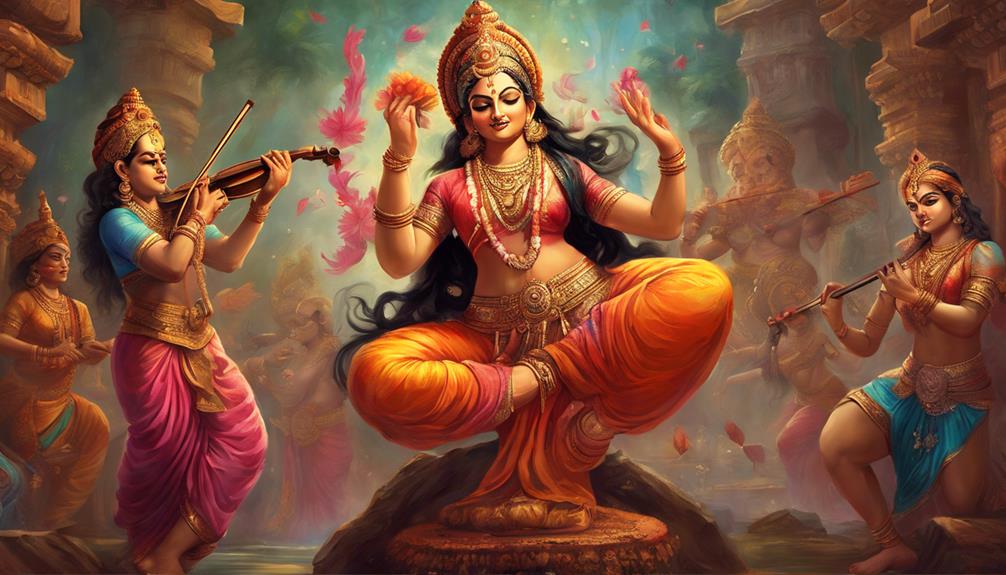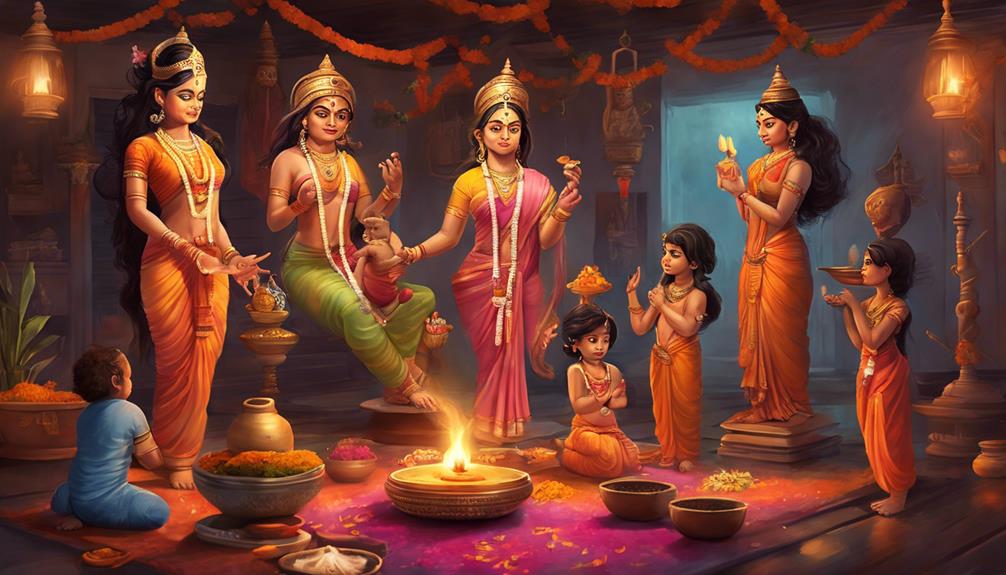Hindu gods and goddesses deeply influence Indian culture and festivals through mythological stories and symbolic rituals. These deities, like Lord Vishnu with his conch shell symbolizing creation, shape cultural narratives and virtues. Festivals honor these deities with symbolic ceremonies and offerings, reinforcing devotion and community bonds. Art, music, and dance also play a significant role, visually representing divine presence and embodying Hindu mythology. Temples stand as architectural marvels, reflecting cultural heritage and spiritual beliefs.
Family structures, social norms, and even modern interpretations are all influenced by these divine beings, showcasing the profound impact of Hindu mythology on India's fabric of life and celebration. The integration of myth, tradition, and spirituality creates a vibrant tapestry of beliefs and practices.
Table of Contents
Key Takeaways
- Hindu gods and goddesses inspire rituals and festivals, connecting individuals with the divine.
- Deities shape social structures and gender roles in Indian society.
- Festivals express devotion through symbolic ceremonies and offerings.
- Art, music, and dance depict divinity, instilling cultural pride and devotion.
- Temples serve as architectural marvels embodying cultural heritage and spiritual beliefs.
Mythological Stories and Cultural Narratives
Exploring the intricate tapestry of Hindu mythology reveals a significant intertwining of cultural narratives that shape Indian traditions and customs. Symbolic imagery plays a vital role in Hindu mythological stories, where each deity is often depicted with specific weapons, animals, or elements symbolizing various virtues or powers. For example, Lord Vishnu holding a conch shell symbolizes the sound of creation, while the lotus he sits on represents purity and beauty.
Ritualistic practices deeply rooted in Hindu mythology are prevalent in Indian culture. These rituals aren't merely routines but are seen as sacred acts connecting individuals with the divine. For instance, the ritual of offering prayers and flowers to Goddess Lakshmi during Diwali symbolizes seeking blessings for prosperity and wealth. These practices serve as a way to honor and invoke the presence of the deities, fostering a sense of spiritual connection and cultural continuity within Indian society. The intricate blend of symbolic imagery and ritualistic practices in Hindu mythology reflects the rich tapestry of Indian culture and traditions.
Festivals and Rituals Honoring Deities
Festivals and rituals in Indian culture intricately honor various deities through symbolic ceremonies and practices that reflect the deep spiritual connections within the community. Ritualistic practices play a significant role in these celebrations, with devotees offering prayers, flowers, incense, and sweets as offerings to the gods and goddesses. These rituals aren't merely routine actions but are imbued with profound meaning and symbolism, signifying devotion and gratitude towards the divine beings.
Community celebrations are a cornerstone of these festivals, bringing people together in joyous gatherings that strengthen social bonds and religious beliefs. Processions through the streets, adorned with colorful decorations and accompanied by music and chants, mark the reverence and adoration for the deities. These events serve as a collective expression of faith and devotion, fostering a sense of unity and shared cultural identity among participants.
Through these festivals and rituals, individuals not only pay homage to the gods and goddesses but also reinforce the values and beliefs that form the foundation of Indian culture and spirituality.
Art, Music, and Dance Depicting Divinity

Depicting divinity through art, music, and dance in Indian culture showcases the profound spiritual connections and expressions of reverence towards the gods and goddesses. The intricate artwork found in temples and religious texts serves as a visual representation of the divine presence believed to inhabit these sacred spaces. Through vibrant paintings, sculptures, and intricate tapestries, artists draw upon spiritual inspiration to create pieces that capture the essence of various deities.
Music plays a significant role in expressing devotion to Hindu gods and goddesses. Traditional musical compositions, known as bhajans and kirtans, are performed to honor and invoke divine blessings. These devotional songs, accompanied by instruments like the tabla and harmonium, create an atmosphere of spiritual transcendence.
Similarly, dance forms such as Bharatanatyam and Odissi incorporate storytelling elements from Hindu mythology, allowing dancers to embody divine beings through intricate movements and expressions. The fusion of artistic expressions with spiritual themes not only entertains but also educates and instills a sense of cultural pride and religious devotion in the hearts of the spectators.
Temples as Cultural and Architectural Marvels
Temples in India stand as unparalleled manifestations of the intricate fusion of cultural heritage and architectural brilliance, embodying centuries of artistic and spiritual devotion. These architectural wonders serve as not only places of worship but also as epicenters of cultural significance. The intricate carvings, majestic domes, and towering spires showcase the skilled craftsmanship of artisans from bygone eras, reflecting the rich tapestry of Indian culture.
Each temple is a testimony to the diverse cultural influences that have shaped India over the centuries. From the Dravidian style of the southern temples to the Nagara style prevalent in the north, these structures exhibit a blend of various architectural traditions. The layout of the temples, with intricate designs and symbolic motifs, reflects the spiritual beliefs and practices of the devotees.
Moreover, temples play a pivotal role in fostering a sense of community and tradition among the people. They serve as gathering places for festivals, cultural events, and religious ceremonies, reinforcing social bonds and preserving age-old customs. The architectural magnificence of these temples not only attracts tourists and historians but also instills a sense of pride and reverence in the hearts of the local populace.
Influence on Family and Social Structures

The familial and social structures in India are profoundly influenced by the presence and teachings of Hindu Gods and Goddesses, shaping the intricate tapestry of relationships and societal norms within the community. Gender roles play a significant role in Hindu families, with deities serving as archetypes for behavior and expectations. For instance, the goddess Lakshmi symbolizes prosperity and abundance, influencing the role of women as caretakers of the family's wealth and well-being. On the other hand, gods like Vishnu embody protection and stability, often leading men to assume the role of provider and protector within the household.
Community traditions are also deeply intertwined with the worship of Hindu deities. Festivals and rituals centered around specific gods and goddesses serve as occasions for families to come together, reinforcing social bonds and cultural practices. These traditions not only strengthen family ties but also foster a sense of belonging and continuity within the wider community. The influence of Hindu gods and goddesses on family and social structures in India is a confirmation of the enduring impact of religious beliefs on everyday life.
Modern Interpretations and Relevance
In the contemporary landscape of Indian culture and society, the reinterpretation and relevance of Hindu Gods and Goddesses have sparked intriguing discussions on the evolution of traditional beliefs and practices. Contemporary interpretations of these deities often focus on their cultural significance in shaping modern Indian identity. In a rapidly changing world, where traditional customs intersect with globalization and technology, Hindu Gods and Goddesses continue to play a significant role in shaping societal norms and values.
Moreover, the influence of these divine figures extends beyond religious contexts into pop culture, further solidifying their societal impact. Modern reinterpretations of Hindu Gods and Goddesses in films, literature, art, and fashion reflect the ongoing relevance and adaptability of these ancient deities in contemporary India. Through these mediums, the timeless stories and teachings associated with these divine beings aren't only preserved but also made accessible to a wider audience, ensuring their continued relevance in an ever-evolving cultural landscape.
Frequently Asked Questions
How Do Hindu Gods and Goddesses Influence the Development of Indian Cuisine and Culinary Traditions?
Indian spices are integral to the cuisine, reflecting a rich tapestry of flavors. Ritual feasts celebrate deities, incorporating these divine ingredients. The influence of Hindu gods and goddesses can be tasted in each dish, honoring tradition and spirituality.
What Role Do Hindu Deities Play in Shaping the Traditional Indian Education System and Knowledge Transmission?
In shaping the traditional Indian education system and knowledge transmission, Hindu deities play a significant role. They provide spiritual guidance that intertwines with educational philosophy, fostering cultural transmission and academic learning that goes beyond mere textbooks.
How Have Hindu Gods and Goddesses Influenced the Evolution of Indian Fashion and Textile Traditions?
Influencing textile innovations, Hindu gods and goddesses have shaped Indian fashion trends. Their symbolism and stories inspire intricate designs in garments, reflecting cultural values. This synthesis of spirituality and style continues to evolve, enriching India's fashion legacy.
In What Ways Do Hindu Deities Inspire the Practice of Traditional Indian Medicine and Healing Techniques?
Hindu deities serve as spiritual inspiration guiding healing practices in traditional Indian medicine. Through the use of medicinal herbs and ritual ceremonies, practitioners honor these divine beings, fostering well-being and balance.
How Do Hindu Gods and Goddesses Impact the Environmental Conservation and Sustainability Efforts in India?
In India, Hindu gods and goddesses serve as symbols of environmental conservation and sustainability efforts. Their teachings on respect for nature and balance inspire communities to protect the environment for future generations.
Conclusion
To sum up, the impact of Hindu gods and goddesses on Indian culture and festivals is deep and multifaceted.
From mythological stories and cultural narratives to festivals, rituals, art, music, dance, temples, and even family and social structures, their presence is woven into every aspect of Indian life.
Their timeless teachings and symbolism continue to shape and inspire modern interpretations, making them a crucial and relevant part of Indian identity and heritage.